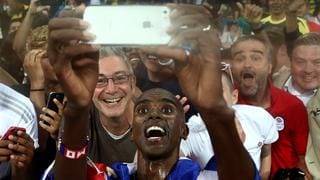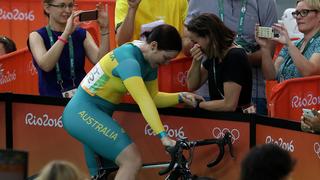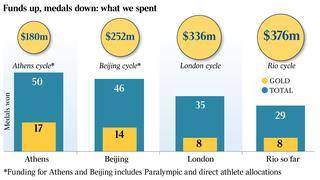barryqwalsh
Gold Member
- Sep 30, 2014
- 3,397
- 250
- 140
INQUIRER
Australia looks at national lottery to finance Olympic athletes

Britain’s Mo Farah snaps a selfie after winning the men’s 5000m final at the Olympic Stadium in Rio de Janeiro yesterday.
Meares has won medals at every Olympics since the Sydney Games, she has carried the flag into an opening ceremony, she has captivated us with her power and poise. After she raced her final lap in Rio, she let us all in on a little secret about Olympic sport: “I always go out to win; so does every other bastard in the world too.”
As Australian sport responds to its humbling experience at these Games, cycling is at the sharp end of a heated debate. In the four years before Rio, the Australian Sports Commission allocated $31.7 million to road, track and BMX cycling, a sum second only to swimming. At the completion of the road and track programs, our cyclists had won two minor medals: a silver and Meares’s bronze in the Keirin. “The starting point is that the cycling results in Rio have been very disappointing,’’ Cycling Australia president Malcolm Speed tells The Australian. “There is much to be done to restore our world standing.’’
It will take a while for Cycling Australia to understand what happened. Individual preparations and performances will need to be reviewed, team strategies examined and bad luck — such as the training crash that cruelled the campaign of our highly fancied women’s pursuit team — accounted for under the vagaries of sport. Yet already part of the problem is clear. Our great track rival, Great Britain, was simply much better. “We had a lot of bad luck and were blitzed by the Great Britain team,’’ Speed says. “We performed below expectations and we are not quite sure why that was, other than Great Britain was much better than it had been previously.’’
Vaping risk similar to smoking
CHRIS SMYTH
Granddaughter held over murder
MEREDITH BOOTH

It is one thing for Australia to have a disappointing Olympics. It is another for Australians to do poorly when Britain is doing so well. Expect to hear plenty of comparative analysis on British sporting excellence and an Australian sporting model starting to fray, as evidenced by the recriminations being led by Australian Olympic Committee boss John Coates.
Two themes will dominate: whether Australia needs a British-style national lottery to fund its Olympic sports and how that funding should best be distributed to elevate our sinking place on the medal tally.
The question of a national lottery is being examined by lawyers working for the Australian Sports Commission, the government agency that controls the purse strings for Australian sport. There is strong support within the ASC for the establishment of a lottery. The main impediment is our constitutional arrangements that give the states, rather than the commonwealth, licensing rights to lotteries. A solution being examined by the ASC is whether an online national lottery, rather than a traditional one, could be established without impinging those rights.
The politics are fraught, with powerful private operators such as Tattersalls likely to oppose the commonwealth moving in on their turf. The potential rewards for our Olympic sporting teams and athletes are immense; an estimated additional $50m to $100m a year flowing into high-performance programs without placing an additional burden on the federal budget. ASC chairman John Wylie started championing the idea of a lottery a year before Rio. Though he is unlikely to blame Australia’s performance in Rio on a lack of funding when he publicly responds to the mounting complaints in his in-tray, any sensible comparison with Britain reveals an unaffordable truth.
Since 2011, the year before the London Games, Australia’s sport budget has been in decline. In 2010-11, the ASC was allocated $268m to cover its own costs and finance sport. In the present financial year, that figure is $254m. Adjusted for inflation, this represents a funding cut of about 15 per cent. Over the same period, the ASC increased its funding of high-performance programs, which is mostly Olympic sports, by 12 per cent in nominal terms. Put simply, Australian sport has had to do more with less. The ASC masked the problem this funding cycle by shedding staff and cutting administrative costs. It won’t be able to do that leading up to Tokyo.
In Britain, the national lottery poured $478m into high-performance sport in the four years before Rio. In Australia, over the same period, taxpayers were asked to foot a $376m bill, out of a stretched health budget, to prepare an Olympic team larger but less successful than Britain’s. Australia has outperformed Britain in Rio when population sizes are taken into account, but only just. According to a medals per capita table, Australia ranks 14th in the world and Britain 18th. At these Games, the notion of Australian exceptionalism on the sporting field has been exposed as a myth.
For the sake of the argument, let’s assume Australia establishes a lottery and dramatically increases the funding available for Olympic sports. A closer examination of the British approach to sports funding reveals the rub for Australian sports that don’t have a history of Olympic success. The ASC’s contentious Winning Edge model skews money towards sports like swimming, rowing and cycling, which have a strong following in Australia, a track record of winning Olympic medals and good governance. However, despite public claims by Coates and others to the contrary, the Australian funding model has not forsaken smaller sports. Of the 29 Olympic sports, 22 received more funding over the four years before Rio than the corresponding years before London. Our gold medal-winning modern pentathlete Chloe Esposito received nothing from the government before London but has benefited from $200,000 in ASC funding towards her sport over the past four years.
UK Sport’s funding model is called No Compromise. In keeping with its title, it is more tightly targeted than Winning Edge. It takes a ruthless approach towards sports that do not win medals. In the Rio cycle, UK Sport funding for basketball, table tennis and synchronised swimming was cut to zero. New Zealand, a sporting nation that sits just below the Usain Bolt-powered Jamaica on the medals per capita table, has a similarly ruthless approach. In Rio, Australia contested 10 team sports where Britain fielded teams in five and New Zealand in just four. It is one thing to want to match it with the Brits. Is the AOC willing to accept what a more targeted funding model will look like?
In the debate to come, there are more fundamental questions that need to be asked. Do we commit public funds to sport only to see Australian athletes win at the Olympics? Do we value Olympic gold ahead of encouraging more primary school children to play sport and protecting the strength of community sport? Do we expect Australians with world titles to win every time they jump into an Olympic pool, or do we temper this expectation with what they, Meares and every athlete already knows: that every other bastard in the world is trying to win, too?

Anna Meares sheds a tear with old British rival Victoria Pendleton. Picture: Adam Head

Nocookies
Australia looks at national lottery to finance Olympic athletes
Britain’s Mo Farah snaps a selfie after winning the men’s 5000m final at the Olympic Stadium in Rio de Janeiro yesterday.
- CHIP LE GRAND
- The Australian
- 12:00AM August 22, 2016
- Share on Facebook
- Share on Twitter
- Share on email
- Share more...
Meares has won medals at every Olympics since the Sydney Games, she has carried the flag into an opening ceremony, she has captivated us with her power and poise. After she raced her final lap in Rio, she let us all in on a little secret about Olympic sport: “I always go out to win; so does every other bastard in the world too.”
As Australian sport responds to its humbling experience at these Games, cycling is at the sharp end of a heated debate. In the four years before Rio, the Australian Sports Commission allocated $31.7 million to road, track and BMX cycling, a sum second only to swimming. At the completion of the road and track programs, our cyclists had won two minor medals: a silver and Meares’s bronze in the Keirin. “The starting point is that the cycling results in Rio have been very disappointing,’’ Cycling Australia president Malcolm Speed tells The Australian. “There is much to be done to restore our world standing.’’
It will take a while for Cycling Australia to understand what happened. Individual preparations and performances will need to be reviewed, team strategies examined and bad luck — such as the training crash that cruelled the campaign of our highly fancied women’s pursuit team — accounted for under the vagaries of sport. Yet already part of the problem is clear. Our great track rival, Great Britain, was simply much better. “We had a lot of bad luck and were blitzed by the Great Britain team,’’ Speed says. “We performed below expectations and we are not quite sure why that was, other than Great Britain was much better than it had been previously.’’
Vaping risk similar to smoking
CHRIS SMYTH
Granddaughter held over murder
MEREDITH BOOTH
It is one thing for Australia to have a disappointing Olympics. It is another for Australians to do poorly when Britain is doing so well. Expect to hear plenty of comparative analysis on British sporting excellence and an Australian sporting model starting to fray, as evidenced by the recriminations being led by Australian Olympic Committee boss John Coates.
Two themes will dominate: whether Australia needs a British-style national lottery to fund its Olympic sports and how that funding should best be distributed to elevate our sinking place on the medal tally.
The question of a national lottery is being examined by lawyers working for the Australian Sports Commission, the government agency that controls the purse strings for Australian sport. There is strong support within the ASC for the establishment of a lottery. The main impediment is our constitutional arrangements that give the states, rather than the commonwealth, licensing rights to lotteries. A solution being examined by the ASC is whether an online national lottery, rather than a traditional one, could be established without impinging those rights.
The politics are fraught, with powerful private operators such as Tattersalls likely to oppose the commonwealth moving in on their turf. The potential rewards for our Olympic sporting teams and athletes are immense; an estimated additional $50m to $100m a year flowing into high-performance programs without placing an additional burden on the federal budget. ASC chairman John Wylie started championing the idea of a lottery a year before Rio. Though he is unlikely to blame Australia’s performance in Rio on a lack of funding when he publicly responds to the mounting complaints in his in-tray, any sensible comparison with Britain reveals an unaffordable truth.
Since 2011, the year before the London Games, Australia’s sport budget has been in decline. In 2010-11, the ASC was allocated $268m to cover its own costs and finance sport. In the present financial year, that figure is $254m. Adjusted for inflation, this represents a funding cut of about 15 per cent. Over the same period, the ASC increased its funding of high-performance programs, which is mostly Olympic sports, by 12 per cent in nominal terms. Put simply, Australian sport has had to do more with less. The ASC masked the problem this funding cycle by shedding staff and cutting administrative costs. It won’t be able to do that leading up to Tokyo.
In Britain, the national lottery poured $478m into high-performance sport in the four years before Rio. In Australia, over the same period, taxpayers were asked to foot a $376m bill, out of a stretched health budget, to prepare an Olympic team larger but less successful than Britain’s. Australia has outperformed Britain in Rio when population sizes are taken into account, but only just. According to a medals per capita table, Australia ranks 14th in the world and Britain 18th. At these Games, the notion of Australian exceptionalism on the sporting field has been exposed as a myth.
For the sake of the argument, let’s assume Australia establishes a lottery and dramatically increases the funding available for Olympic sports. A closer examination of the British approach to sports funding reveals the rub for Australian sports that don’t have a history of Olympic success. The ASC’s contentious Winning Edge model skews money towards sports like swimming, rowing and cycling, which have a strong following in Australia, a track record of winning Olympic medals and good governance. However, despite public claims by Coates and others to the contrary, the Australian funding model has not forsaken smaller sports. Of the 29 Olympic sports, 22 received more funding over the four years before Rio than the corresponding years before London. Our gold medal-winning modern pentathlete Chloe Esposito received nothing from the government before London but has benefited from $200,000 in ASC funding towards her sport over the past four years.
UK Sport’s funding model is called No Compromise. In keeping with its title, it is more tightly targeted than Winning Edge. It takes a ruthless approach towards sports that do not win medals. In the Rio cycle, UK Sport funding for basketball, table tennis and synchronised swimming was cut to zero. New Zealand, a sporting nation that sits just below the Usain Bolt-powered Jamaica on the medals per capita table, has a similarly ruthless approach. In Rio, Australia contested 10 team sports where Britain fielded teams in five and New Zealand in just four. It is one thing to want to match it with the Brits. Is the AOC willing to accept what a more targeted funding model will look like?
In the debate to come, there are more fundamental questions that need to be asked. Do we commit public funds to sport only to see Australian athletes win at the Olympics? Do we value Olympic gold ahead of encouraging more primary school children to play sport and protecting the strength of community sport? Do we expect Australians with world titles to win every time they jump into an Olympic pool, or do we temper this expectation with what they, Meares and every athlete already knows: that every other bastard in the world is trying to win, too?
Anna Meares sheds a tear with old British rival Victoria Pendleton. Picture: Adam Head
Nocookies
